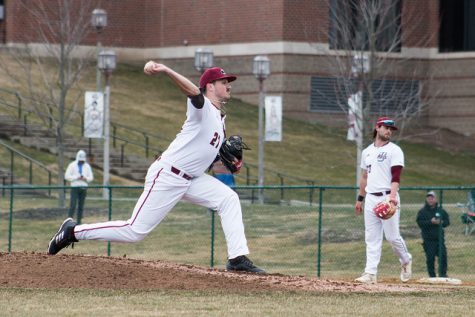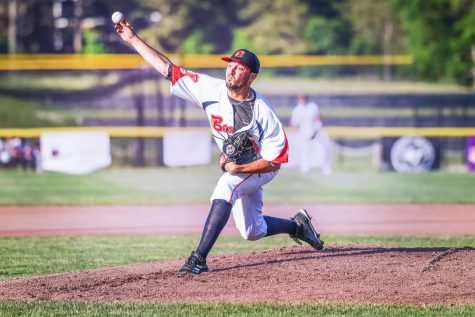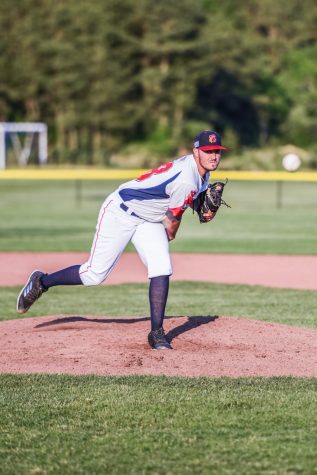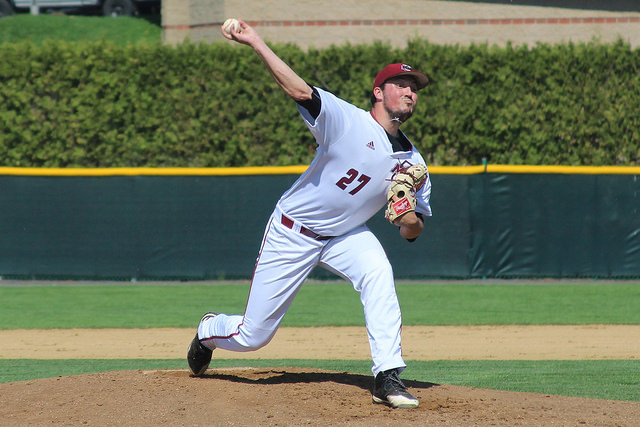(Collegian File Photo)
Justin Lasko’s dominance at one end of the state can be traced back to the other
Could Lasko be another future star to come from the Cape League?
February 20, 2019
On Cape Cod, while the sun beats down on locals and celebrities alike enjoying the sandy shores of the Atlantic Ocean, a different kind of star is being born on the South Shore between the months of June and August.
Hundreds of the best collegiate baseball players in the country make the trip down to the Cape every summer to showcase their skills in the Cape Cod Baseball League. With them come countless fans ready to see the next crop of future Major League Baseball players and scouts ready to pick from them.
In some ways, it’s like being at the same open mic night where Jerry Seinfeld got his start in 1976 or watching a band named Coldplay perform at a London dive bar in the the mid-1990s. The potential for stardom and prominence is massive at these Cape League games. From Carlton Fisk to Nomar Garciaparra to Buster Posey to Chris Sale, the Cape League has produced top-notch MLB players for generations.
Justin Lasko of the Massachusetts baseball team has pitched in the prestigious league for the past two summers, and the impact is palpable.

Almost every elite athlete has something that motivates them. Tom Brady was the 199th pick in his NFL draft. Michael Jordan was cut from his high school basketball team his sophomore year. For Lasko, it’s not as specific as that, but more a trend that has followed him throughout his baseball career.
“It’s just what I’ve been through playing baseball,” said Lasko when posed with a moment of adversity. “Playing with some of the best players and really not being the best on any of my teams. It kind of just keeps me going and makes me want to be the best on any team I play on.”
Lasko’s entrance into the Cape Cod League followed that vein. After his sophomore year in the early summer of 2017, he wanted a place to play and found himself as a temporary player on the Chatham Anglers.
“My pitching coach knows UMass’ pitching coach really well and said ‘Hey, they’ve got a pitcher who they think will be a great temporary player for us,’” said then-Chatham coach John Schiffner. “I said, ‘Fine, you like him?’… I approved of it. If I can help a New England kid out or give him a shot in the Cape Cod League, I thought that was important.”
Since Lasko was only a temporary player that summer, the pressure was fully on.
“You have to go out and perform and if you don’t, there’s a pretty damn good chance you’re not going to be there,” said Lasko of the pressure he felt as a temporary player. “You have to go out there every single time and there’s pressure to perform. That can be a little bit much but you really have to focus on the game and one at a time.”
Despite the pressure, Lasko performed in Chatham. He went 2-0 with an ERA of 2.79.
“I thought he did very well,” Schiffner said. “I would’ve taken him as a full-time player if my roster wasn’t full. To me, he was an ideal middle relief guy, spot starter when we needed him and he loved it. When he left, the pitching coach and I both said to not shut down and if a spot opens up, we’d like to bring you back. He’d earned the right to be on this team.”
Aside from his pitching talents, there was another attribute that Schiffner loved about Lasko.
“He was an outstanding person,” Schiffner said. “In today’s day and age, some of these kids are so damn entitled. He was the most thankful kid I’ve ever talked to. He was so appreciative of us giving him an opportunity to play in the Cape Cod League.”
UMass head coach Matt Reynolds noticed that about Lasko just as quickly as Schiffner did.
“Some of that gratitude he would have for that opportunity is that he wasn’t the guy coming out of high school that was already throwing the ball low 90s,” Reynolds said. “He’s had to build himself up from where he was to where he is right now.
“I think that gratitude is somewhat based in the fact that he’s really had to fight for everything he’s gotten and without just naturally being blessed with a 95-mile-per-hour fastball, to be able to get himself to the point where he can pitch and have success against the best college players in the country in the Cape.”
Looking back on that first summer, Lasko was able to take a lot away from it.
“Playing with a bunch of guys that came from prestigious schools that have a bunch of coaches that have played big league baseball,” answered the 6-foot-4 right-hander when asked what he liked about the summer in Chatham. “You also have the coaches there that coached at the highest levels and taking one thing from each guy — picking their brains a little bit, talking to them and seeing how things are done there.”
When it came to the summer of 2018, Lasko found himself once again looking for a place to play. He gave his former coach from Chatham a call and Schiffner gladly helped. Within the day, Lasko received two calls — one from Bourne Braves head coach Harvey Shapiro and the other from Harwich Mariners head coach Steve Englert. Shapiro called first and locked in the coveted right-hander from UMass.
Like in Chatham, Lasko began his time in Bourne as a temporary player. But after his third start, Shapiro approached him and told him that he wanted him around for the full summer.
The move paid serious dividends for the Braves. Lasko went 3-2 with a 3.76 ERA in eight starts.
“It was a lot of fun,” said the Stratford, Conn. native of his time in Bourne. “I knew that they believed in me. Everytime I took the mound, they told me they had confidence in me. I knew the players behind me had the same confidence. It was just fun to go out there every single time and go out and expect to win with the players surrounding me.”
The confidence surrounding him was well warranted, and his time with the Braves peaked when he was selected to pitch in the All-Star game.
“My best moment in Bourne was being selected to pitch in the All-Star game,” Lasko said. “That was a great experience. It was really fun.”
He finished off the summer with some hardware by winning the John Claffey award — an honor given to a distinguished player who comes from New England or plays for a New England college or university.
“It’s funny because both summers he went out there, he went out there on a temporary contract and just proved himself worthy for a full contract and then proved himself worthy of being one of the better pitchers for both Chatham and Bourne,” said UMass pitching coach Nate Cole. “That’s him proving his worth to the team while he was out there each summer.”

To understand Lasko, you have to realize there are two sides to him: the mental side and the technical side.
“The first thing is the competitiveness factor,” Reynolds said. “He’s a super competitive kid. Winning and losing really matters to him. How he performs really matters to him. He does a really nice job of preparing that way too. It’s not just when he puts that uniform on that his competitiveness comes out — it’s in his bullpens, when we’re upstairs in the cages and he’s throwing live to our own hitters.
“He wants to win at all times and I think that really helps him. I think that’s his best quality.”
While his preparation is also strong, Lasko’s ability to make in-game adjustments stands out more. Those adjustments are a lot easier because he understands the game of baseball and the art of pitching inside and out.
“He’s a really smart kid,” Cole said. “He knows how to pitch; he knows pitching. In my 12, 13 years of coaching, he’s by far one of the smartest pitchers when it comes to understanding how to get hitters out and what he needs to do on the mound on a given day and the adjustments he needs to make within the game.”
That competitiveness and intelligence helped him rank seventh in ERA among all qualified Atlantic 10 pitchers at 2.52. The Minutemen only earned six wins in A-10 play — Lasko had four of them.
“If you look at the stats and everything I’ve gathered, it’s been a steady climb for him,” Reynolds said. “Every year statistically has gotten better and better. Every year his role has gone up and up. I think last year, he had already established himself as a guy who had the confidence of his teammates and coaching staff to give him the ball against the A-10’s best.”
Then there’s the technical side of things. Lasko sports four different pitches, none exceeding 92 miles per hour. He has a slider, a traditional curveball, a changeup and a two-seam fastball.
“The difference maker for him is his ability to run his two-seam fastball,” said Reynolds, in his second year at UMass. “It moves, it dives and that’s probably an equalizer for him where he’s not just going to 96 a four-seamer right by somebody. But he can run a 90-91 two-seamer right under a righty’s hands or away from a lefty, and it has significant depth and movement to it. It’s really a difference maker for him.”
Another aspect of his game that’s helped him immensely is his ability to throw strikes. It’s one that Reynolds loves the most.
“The biggest part is he throws everything for a strike,” he said. “It’s not a situation where push comes to shove and we need to have a strike on this pitch and three quarters of his arsenal goes out the window. Instead, it’s all still available. And as a hitter, it makes it really difficult and you can’t sit on one thing and you just have to be reactive rather than being aggressive.”
These skills and characteristics made for him to be a sponge with the Cape Cod League. And there would be one big trait he’d pick up in the vacation capital of New England.

Many describe the Cape Cod League as an equalizer — a place where all of the best collegiate baseball players can come and play on an equal playing field. And because Lasko thrived on that field, he bolstered an important trait for all elite athletes.
“I think that he gained confidence being [in the Cape],” Schiffner said. “If you come to the Cape Cod league, you’re one of the best 300 baseball players in the country. It helped him confidence-wise. He looked around and saw that his stuff fit here and he could pitch against that kid from North Carolina.
“If you can handle the Cape Cod league, it’s going to make you a better player, and I know it sounds cliché, but also a better person. You’ve competed with the best and it has to help your outlook.”
Lasko’s results during his junior year season at UMass would indicate a clear increase in confidence. All of his pitching statistics got better as he became more comfortable in the role as the Friday starter, the one who faces every other team’s ace.
To add to that, he almost became a permanent player in Chatham his first summer and then did so in Bourne after three starts in his second summer.
“Having that understanding that you can get the best hitters in the country out will develop confidence in anyone,” Cole said. “You see that across the country with many guys that go out to the Cape and obviously him having a couple summers out there and having some success for a couple summers, that’s only going to benefit him moving forward to his senior season here.”
For Lasko, there was another component of his time in the Cape Cod league that he feels can be directly translated to this UMass team.
“Just the mentality of everyday going to the ballpark with something you can get better at,” said Lasko. “Not every day in the Cape you’re going to pitch, because of the talented bullpen and roster — every single guy can play. Not everyone gets to play every day. But you have to find a way when you’re not playing, when you’re not getting the game reps, some way or fashion in that day to be better next time you get your game reps.”
For this upcoming season, the pitching staff for UMass includes eight freshmen. Lasko’s time in the Cape Cod league will prove to be vital in mentoring them.
“I’ll just be trying to teach them everything that I’ve learned over my three years here and my summers,” he said. “Just showing them that it goes by really damn quick and it’s gone before you know it, so you have to really take advantage of every opportunity you get and not to take it for granted.”
As Lasko enters his last act at UMass, there’s still things the coaching staff would like him to improve upon. Reynolds said they think he has one more jump in velocity; Cole said how his star pitcher is becoming more and more of a vocal leader in the clubhouse.
But his overall impact as a leader and mentor to the rest of the team is apparent at all times. He’s one of three captains on the team and the only one from the pitching staff. According to Reynolds, he was unanimously selected by his peers and coaches.
“We have a very young staff, so we really need that leadership to be able to set the course,” Reynolds said. “We can do everything we can from the coaching side of things but we need players when we’re not around who are setting the example at practice and off the field for these younger guys. And on the pitching staff, the magnifying glass is even greater.”
The uncertainty of the future may loom large. But with the growth from his past four years and two summers, there’s a good chance he’ll be added to the list of stars the Cape Cod league has bred. And for those who watched him pitched on the Cape in 2018, they’ll have seen where it all began.
Evan Marinofsky can be reached at [email protected] and followed on Twitter @emarinofsky.

Steve and Jan Minaudo • Mar 2, 2019 at 3:31 pm
My wife and I were Justin’s host parents this past summer when he played with the Bourne Braves of the Cape Cod Baseball League. We enjoyed having him. He was engaging and very respectful. He interacted with the other players that stayed with us and they have developed long term friendships. It was very difficult having to say goodbye at the end of the season. We miss our “Summer Son” very much.